Archive for July, 2007
Earlier in this post we were tracking the Orissa JEE counseling of GEWO category. Now comes the big one the GE category which will also tell us which colleges are preferred by students.
Orissa JEE website has information on seat availability in various programs and various colleges updated daily based on what happens in counseling that day. Following are links in that site as of today. I have added the rank information based on the counseling schedule. Aspirants whose counseling is yet to happen may look at these links and get some idea on their chances.
Continue Reading July 28th, 2007
With an eye to help Orissa universities take advantage of the opportunities provided by UGC we will dig through UGC pages and find out and highlight programs, opportunities and initiatives.
We start with the page “http://www.ugc.ac.in/financialsupport/guideline.html.” It has the following links:
Continue Reading July 28th, 2007
Samaja reports on the progress towards the establishment of 1000 hostels of 100+ capacity each for Adivasi students.
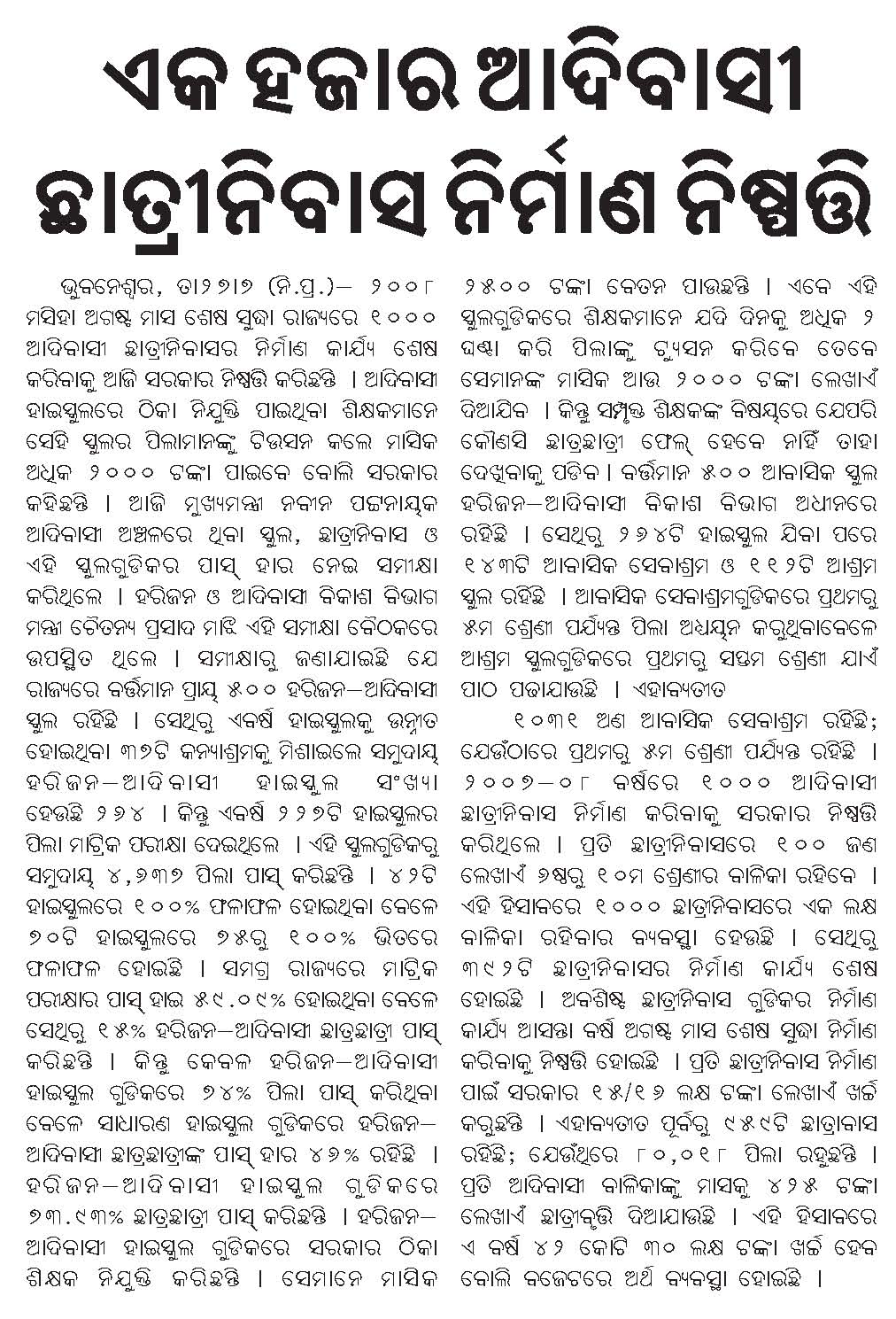
July 28th, 2007
Devdas babu has done it! While universities like Fakir Mohan University, North Orissa University, BPUT and Utkal University of Culture are yet to get "funded by UGC" tag, Ravenshaw which was made a university on November 15 2006 has received UGC approval to get into the "funded by UGC tag." Mega kudos to Devdas Chhotray, the VC of Ravenshaw University, who made this possible within so short a time. Following is Sambada’s report on this.
The document has many details on what kind of funding UGC provides to state universities.
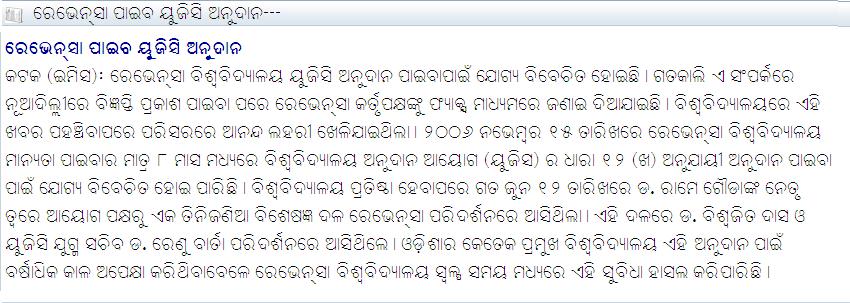
July 28th, 2007
Daily Pioneer reports on this. Following are some excerpts.
The State Government is working on a proposal to upgrade the six-decade-old Vikram Dev School of Art and Craft at Jeypore as a degree college from the current academic session. From now on, the school will be known as Vikram Dev College of Art and Craft, sources in the Culture Department said…
Culture Secretary Gopinath Mohanty set up a committee comprising Orissa Lalit Kala Akadami secretary Chandramani Biwal, Utkal University of Culture’s officer on special duty Bhawani Charan Biswal and BK College of Art and Craft (BKAC) principal AC Sahoo, to have an on-the-spot assessment of the situation. …
It has recommended introduction of Bachelor’s Degree programme in visual art under the Utkal University of Culture from the current academic year.
The students, who pass out of the institution, would be directly admitted to degree courses while those who were intermediates would be considered for admission after an aptitude test, the committee has observed.
… the students of the Vikram Dev College should be provided stipend, it has suggested.
The committee has advised the faculty members of the institution to run Government-affiliated Sunday Art Schools at Koraput, Malkangiri, Nabarangpur and Jeypore immediately to prepare the students of the KBK region for admission in the institution.
It has also recommended posting of an experienced lecturer of the Government College of Art and Craft of Khallikote as the principal of the proposed degree college to look after teaching and administration in an effective manner. …
The abandoned office of the Irrigation Department in Jeypore town could be allotted to the institution till a permanent campus comes up, the committee has stated.
July 28th, 2007
The committee has reduced the fees from its earlier recommendation of Rs 450,000 to Rs 400,000. Following is Dharitri’s report on this.
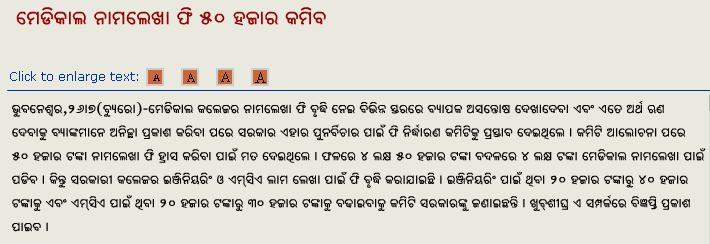
July 28th, 2007
I came across the IIIT proposal that Orissa had prepared in 1997. Here it is (7MB). Since that proposal, its been 10 years and finally we will have the IIIT. During these 10 years many IIITs were established in other states: Gwalior (1997), Hyderabad (1998), Allahabad (1999), Bangalore (1999), Kolkata (2000), Pune, Kerala, Jabalpur and Amethi (Campus of Allahbad).
July 27th, 2007
Hindustan Times reports on this. Following are some excerpts.
The HRD Ministry has proposed that English learning should be made mandatory for all students from class III to enhance their computer learning skills and for better chances of employment.
For the first time, HRD Ministry and Planning Commission has linked English learning with computer education. In a bid to introduce computer education in all the government schools from upper primary level, the government wants that English should be taught from class III. …
The government in the 11th Five-Year Plan wants that schools getting fund under Sarva Siksha Abhiyan should introduce English. The final decision rests with the state governments, as education is a state subject, the official said. “From our consultation with the state governments it appears that they are not adverse to the idea,” an official said.
Under the plan, the National Council for Educational Research and Training (NCERT) will prepare training modules for the teachers on English to be taught at the primary level. “We want to cover all government school students under the Information, Communication and Training (ICT) programme and that cannot happen without adequate knowledge of English,” he said.
Some states like Andhra Pradesh have already introduced English as a compulsory subject from class I.
With the Centre stressing on improving employability of students passing from public schools, the ministry expects other states to follow the suit. The government is willing to provide additional funds for ICT at primary level, if the states make English as a mandatory.
July 27th, 2007
New Indian Express reports on this. Following are some excerpts.
This is the second time in a month the Higher Education Department increased the student intake capacity of junior and degree colleges. Earlier on July 12, 822 seats were added in Plus Two Science and Commerce in six government colleges.
Gangadhar Meher (GM) Autonomous College, Sambalpur, will have 96 more seats in Plus Three Commerce in addition to the existing strength of 288. The students strength in Statistics in GM Junior College has been increased from 48 to 80. However, the Science seats in the Plus Two level has remained unchanged at 256.
In NC Autonomous College, Jajpur, Commerce seats in degree level have been increased to 128 from 96.
The State Government has approved the proposal of Ramadevi Women’s College here to open Biotechnology as a self financing course. The college will have 32 seats in B.Sc Biotechnology from the ensuing academic session. Earlier, permission was granted to Government College, Rourkela, to open 32 seats in B.Sc Computer Science in self-financing mode.
This time the Government approved 176 Science seats in four junior colleges. While SCS College, Puri, will have 48 more seats in addition to 304 now, Vikram Dev College, Jeypore, Government Women’s College, Sambalpur, and Fakir Mohan Junior College, Balsore, will have 32 more seats each.
The present capacity of Vikram Dev College and Government Women’s College, Sambalpur, in Plus Two Science is 128 each while FM Junior College has 256 seats.
Plus Two Commerce seats in SCS College has been increased by 32 seats taking the total strength to 160 while in FM Junior College additional 64 seats has been approved as against 128.
In Humanities, 32 more seats have been approved for Government Women’s College, Sambalpur, as against the existing capacity of 192 seats.
July 26th, 2007
Tathya.in has a biographical article on Prof. Gopal Nayak. Following are some excerpts.
Prof. Nayak is the product of the Indian Institute of Technology (IIT), Kharagpur was born at Berhampur in Ganjam district to a family of teachers.
An electrical engineer with a Masters in Business Administration (MBA) from IIM Bangalore did his Ph. D from IIT, Kharagpur.
He has done his Ph. D under the guidance of Prof. Damodar Acharya who was the Vice Chancellor of BPUT, Chairman of AICTE and at present the Director of IIT, Kharagpur.
Prof. Nayak has spent a few years on Industry.
He has worked for Nelco in Mumbai in the product development area and for NTPC in the Procurement automation area.
Prof. Nayak has spent about 20 years in academics.
He is one of the founding Professors of Xavier Institute of Management (XIMB), Bhubaneswar.
As the Professor of Information Systems, he was instrumental in transforming XIMB into the most technology intensive campus in India.
XIMBans give credit to him in creating several firsts management education field: a campus network, providing PC to each student, making Internet accessible 24×7 and giving a technology orientation to the curriculum at XIMB.
He held important positions at XIMB such as the Dean (Academics), IT services and Admissions Co-ordinator.
Prof. Nayak’s most notable contribution is development of Academic Information System (AIS) and PAMIS.
The AIS is being used by many top business schools in the country such as XLRI Jamshedpur, IIM Indore, NITIE Mumbai.
PAMIS has been implemented in 314 blocks and 30 DRDAs in Orissa and is one of the most successful e-governance projects in Orissa.
With this background the Government of Orissa has roped in Prof. Nayak for the IIIT.
With a director of such background IIIT Bhubaneswar should also start offering degrees that relate to business and information systems such as MBA and MIS (Master in Information Systems). One may note that some of the IIITs, such as IIITM Gwalior, do offer such degrees.
July 26th, 2007
Pioneer reports on this teaming up to give training to selected children from several Tribal department run schools. Following are some excerpts.
The SC & ST Research and Training Institute (SCSTRTI) under the ST & SC Development Department has been organising a number of training programmes for the teachers as well as students of tribal schools to promote effective education among the tribals.
The institute, in collaboration with the Institute of Mathematics and Application (IMA) headed by eminent mathematician Professor Swadhin Pattnaik, identified 47 meritorious tribal students of Class VI from different Tribal Department-run schools and provided them an eight-day-long residential training course from July 17 to 24 to prepare them for the Mathematics Olympiad.
The training programme is considered to be unique and innovative, director of the institute, AB Ota, indicated that more and more such programmes would be held in future in the interest of tribal education.
July 26th, 2007
Hindu reports on a draft bill with 16 new central universities. Following are excerpts of that report.
The Union Human Resource Development Ministry is ready with a draft Bill for establishing 16 Central universities across the country.
The draft of the umbrella legislation that will govern all the new proposed Central universities — for the first time — has been sent to various Ministries for their comments. All Central universities so far have been established under different Acts.
As of now, there are only 22 Central universities in the country with Delhi having as many as four while 16 States have none. The proposed universities are believed to have been modelled as unitary, non-affiliating universities on the pattern of the Jawaharlal Nehru and Hyderabad universities.
The States identified for setting up these universities in the next five years at an estimated cost of Rs 5,000 crore in addition to the annual grants are Maharashtra, Kerala, Tamil Nadu, Karnataka, Gujarat, Haryana, Rajasthan, Jammu and Kashmir, Himachal Pradesh, Bihar, Orissa, Chhattisgarh, Madhya Pradesh, Uttarakhand, Jharkhand and Punjab. …
Dr. Singh’s initiative for improved university system came in June when he announced at least one Central university for each State and a degree college for every district following a meeting on higher education with Union Human Resource Development Minister Arjun Singh, and Union Finance Minister P. Chidambaram
Comparing the above list with our list of 19 states which do not yet have central universities following are some observations: (i) Arunachal Pradesh, Sikkim and Tripura are not in the above list perhaps because universities for them was earlier announced, (ii) Goa is replaced by Maharastra and (iii) Madhya Pradesh is in the list, although it is not clear if this is in addition to the tribal university that is to be head quartered in Madhya Pradesh. Five thousand crores for 16 universities means 312.5 crores for each university.
Hindu has another article in its website with much of the same content except the following additional point.
In the 350 districts, where the Gross Enrolment Ratio (GER) was below the national average, Dr. Singh had asked the Centre to assist the States through the University Grants Commission (UGC) in setting up degree colleges to improve the enrolment ratio.
July 26th, 2007
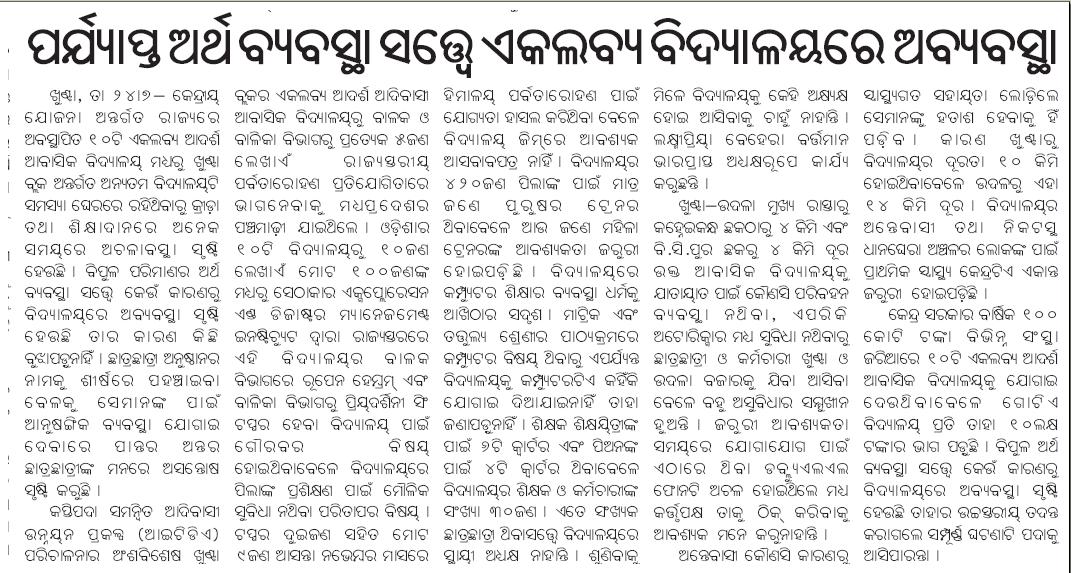
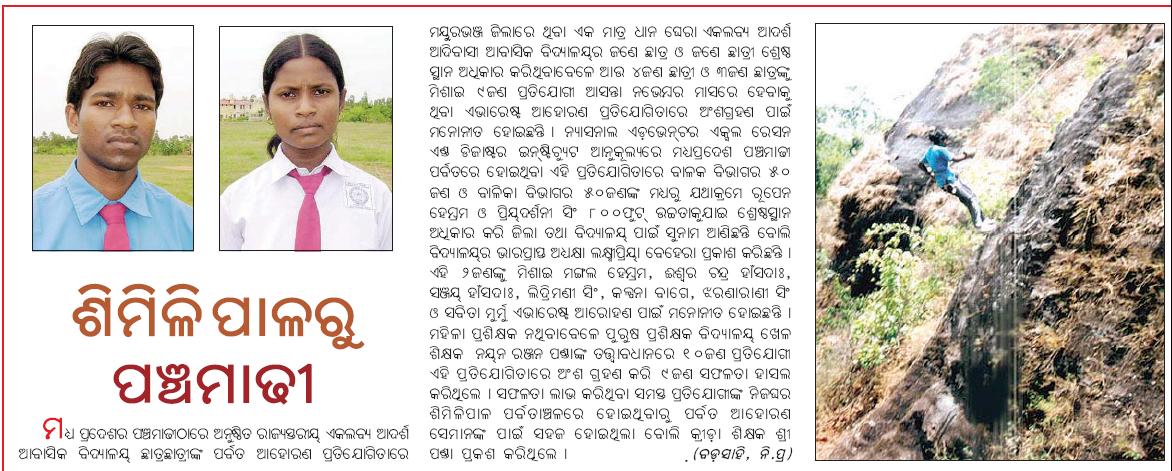
July 25th, 2007
Sambada reports the inauguration of an Apparel training center in Bhubaneswar. (There are 20 such centers now in India.) It also mentions land allotment with respect to IIHT Baragarh. Finally it mentions that more apparel training centers may be opened in Nuapatna, Sambalpur, Rourkela and Baragarh. Following is the news item from Sambada.
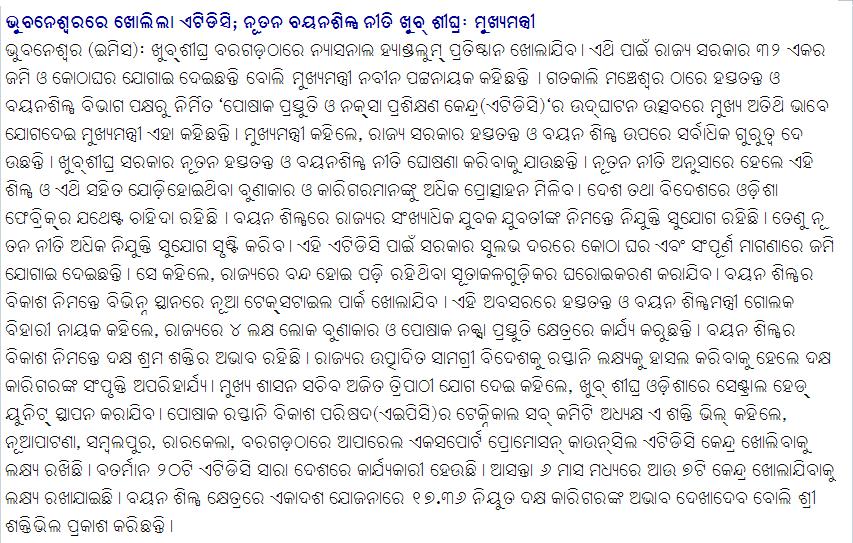
July 25th, 2007
National Board of higher mathematics (NBHM) of the Department of Atomic Energy offers scholarships for students pursuing post graduate in Mathematics. Application for Scholarship for Post Graduate Studies (MA/MSc) in Mathematics for the academic year 2007-2008, in PDF and Word formats are available. Questions papers of previous years are available at these links: 2005 and 2006. The last date for the receipt of completed applications is July 30, 2007.
Following are some other opportunities provided by NBHM.
July 25th, 2007
The new web page of Institute of Mathematics and Applications is http://www.iomaorissa.org/index.html.
(Thanks to Sandip babu for the pointer.)
July 25th, 2007
Next Posts
Previous Posts
